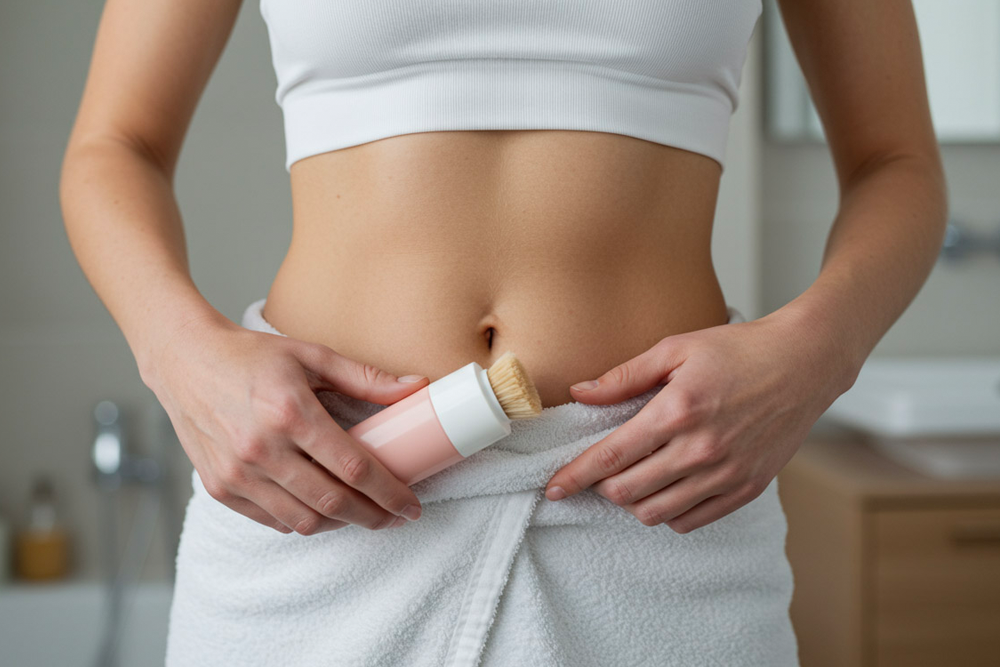Are you one of the many women wondering how to treat vaginal atrophy? Are you familiar with the term? The symptoms? Truth be told, 40% to 57% of postmenopausal women show symptoms of vaginal atrophy and 15% of the female population experiences symptoms before menopause.
Vaginal atrophy, also referred to as atrophic vaginitis, is now being referred to more comprehensively as ‘genitourinary syndrome of menopause’ or GSM. GSM is a common condition that primarily takes place during menopause due to a decline in estrogen levels. It can also be a result of certain cancer treatments that impact hormone levels.
This condition leads to the thinning, drying, and inflammation of the vaginal walls. It causes a number of uncomfortable symptoms like dryness, itching, irritation, painful intercourse, along with a number of urinary symptoms including urgency, frequency, and even urinary tract infections (UTIs). Tackling GSM is important for maintaining vaginal health and overall well-being.
The following provides treatments and tips to alleviate symptoms and help affected women regain their confidence and quality of life.
Before Discussing How To Treat GSM, You Should Learn All About It
To reiterate, genitourinary syndrome of menopause (GSM) is a condition characterized by the thinning, drying, and inflammation of the vaginal walls. It is mainly due to a decrease in estrogen levels. This decrease usually occurs during menopause but can also be a result of certain cancer treatments that affect hormone levels.
The symptoms of GSM are often uncomfortable and can greatly impact a woman's quality of life. As a reminder, common symptoms include vaginal dryness, itching, burning, and irritation; along with a number of urinary symptoms including urgency, frequency, and even urinary tract infections (UTIs). Many women also experience painful intercourse (dyspareunia), which can lead to a decreased interest in sexual activity.
Besides the physical symptoms, vaginal atrophy can have serious emotional and psychological effects. The persistent discomfort and pain can lead to a loss of confidence and self-esteem. Women may feel embarrassed or ashamed, which could affect their intimate relationships.
The fear of pain during intercourse can lead to avoidance of sexual activity, resulting in intimacy issues with partners. This avoidance can create a cycle of emotional distress and make physical complications even worse.
Being fully aware of the symptoms and the emotional impact of GSM is the first step towards getting appropriate treatment and regaining confidence. It's important for women to recognize that these symptoms are not at all uncommon - and they are treatable.
By addressing both the physical and emotional aspects of GSM, women can take proactive steps to improve their health and well-being.
Hormonal Treatments
Hormonal treatments are among the most effective options for managing this condition. These treatments mainly focus on replenishing estrogen levels in the vaginal tissues to relieve symptoms, restore structure and improve the pH of the vagina. One of the most common forms of hormonal treatment is the use of low-dose vaginal estrogen products.
These products come in a number of forms, including creams, rings, and tablets. Vaginal estrogen creams are applied directly to the vaginal tissue, usually daily at first and then less frequently as symptoms improve.
The estrogen ring is a flexible device inserted into the vagina, where it releases a steady dose of estrogen over several months. Vaginal estrogen tablets are inserted into the vagina and typically used on a similar schedule to creams.
Low-dose vaginal estrogen products are very effective at reducing vaginal dryness, itching, and pain during intercourse. Vaginal hormones are different from hormones used for hormone replacement therapies; only the local vaginal tissue will be impacted, avoiding systemic (whole body) effects.
Systemic hormone therapy (HT) is another way to treat vaginal atrophy, especially for women who also experience other menopausal symptoms like hot flashes. Systemic HT involves taking estrogen in pill form, through a patch, or via a gel that is absorbed through the skin.
While systemic HT can alleviate a number of menopausal symptoms, it carries some risks for those who start it much later after menopause. The primary benefit of using systemic HT is to address menopausal symptoms such as hot flashes and bone loss, and is safe when started early on. This is a controversial topic among providers and it is important to discuss the benefits and potential risks with a healthcare provider to decide on the most appropriate treatment approach for you.
Non-Hormonal Treatments
Non-hormonal treatments can also have benefits for managing the symptoms of GSM without the risks associated with hormone therapy. Vaginal moisturizers and lubricants are helpful tools in this category.
Moisturizers, used regularly, help maintain the moisture balance of vaginal tissues, reducing dryness and discomfort. They should be applied a few times a week. Lubricants, used during sexual activity, minimize friction and make intercourse more comfortable.
Vaginal dilators are another valuable option. These devices, available in varying sizes, are inserted into the vagina to help stretch and maintain its elasticity. Regular use of dilators can improve comfort during intercourse and overall vaginal health, especially for women with severe tightness or pain.
A pelvic wand is a device designed for gentle stretching and stimulation of the vaginal tissues and pelvic floor muscles. By massaging the pelvic muscles, the pelvic wand can increase blood flow, relieve muscle tension, and improve tissue health. This helps reduce pain and discomfort associated with vaginal atrophy.
These non-hormonal treatments can greatly alleviate symptoms, improve sexual function, and enrich overall quality of life. They provide some relief for those who cannot or choose not to use hormonal therapies.
Natural Remedies
Natural remedies are a gentle yet effective approach to managing vaginal atrophy, providing alternatives to hormonal treatments. Phytoestrogens, found in plant-based foods like soy and flaxseed, mirror estrogen's effects in the body.
These compounds can help relieve symptoms like vaginal dryness and irritation by promoting estrogen-like activity. By working phytoestrogen-rich foods into your diet, you support vaginal health and maintain moisture levels naturally.
Herbal supplements present another chance for relief. Black cohosh, known for its hormone-balancing properties, is frequently used to ease menopausal symptoms, including vaginal atrophy. Evening primrose oil, abundant in gamma-linolenic acid, offers potential benefits by increasing vaginal moisture and reducing inflammation.
Before including any new supplements into your regimen, be sure to speak with a healthcare provider. This sees to it that the chosen remedies are in keeping with your health needs and do not interact adversely with existing medications or conditions. Professional guidance helps maximize the safety and effects of natural remedies customized to your individual health profile.
The use of natural remedies for vaginal atrophy helps individuals to take proactive steps in managing their health. By employing the benefits of phytoestrogens and herbal supplements (with professional supervision), you can boost your well-being and enjoy improved vaginal comfort and function.
Lifestyle Modifications
Lifestyle modifications are imperative in the management of vaginal atrophy. They are yet another approach to alleviating symptoms and promoting overall well-being.
Regular sexual activity or masturbation plays a big part in maintaining vaginal elasticity and blood flow. This activity stimulates natural lubrication, which is necessary for keeping vaginal tissues healthy and reducing dryness and discomfort associated with vaginal atrophy.
Hydration is equally important. Proper water intake levels support overall bodily functions, including the health of vaginal tissues. Dehydration can worsen dryness, driving home the importance of drinking enough fluids throughout the day to maintain appropriate vaginal moisture levels.
A balanced diet rich in fruits, vegetables, lean proteins, and whole grains contributes greatly to overall health and hormonal balance - both of which are central to dealing with vaginal atrophy. Foods high in omega-3 fatty acids, like fish and flaxseeds, have anti-inflammatory properties that can also support vaginal health.
Including these lifestyle modifications in daily routines helps women proactively manage vaginal atrophy. By prioritizing regular sexual activity, proper hydration, and a nutritious diet, they can improve vaginal health, alleviate discomfort, and promote overall well-being. These lifestyle adjustments do more than address symptoms - they also nurture a complete approach to health maintenance and vitality.
Pelvic Floor Exercises
Pelvic floor exercises, which can include both relaxation and strengthening exercises (also referred to as Kegel exercises), are useful for addressing pelvic floor dysfunction and improving vaginal health. Optimal pelvic floor strength is crucial for supporting pelvic organs, core strength, pleasurable intercourse and eliminating unwanted issues such as urinary incontinence.
Optimizing the function of your pelvic floor, including strengthening or kegel exercises, can improve sexual function by promoting vaginal tone and increasing blood flow to the genital area. This can lead to heightened sensitivity and improved arousal.
Women experiencing vaginal dryness or discomfort during intercourse may discover that addressing pelvic floor dysfunction helps improve lubrication and reduce pain. Seeking out care from a pelvic floor physical therapist can help you understand the best approach, which may include strengthening exercises or kegels.
Here’s how to perform Kegel exercises: You must first identify the correct muscles. You can do this by tightening your pelvic floor as if you were stopping the flow of urine. Hold the contraction for a few seconds, then relax and repeat. Start with a few repetitions a day and gradually increase to several sets throughout the day.
Stress Management and Self-Care
Stress management is important in managing symptoms of vaginal atrophy, including a variety of techniques that promote relaxation and overall well-being. Practices like yoga, meditation, deep breathing exercises, and progressive muscle relaxation are proven methods to reduce stress levels.
These activities help lower cortisol, the stress hormone. So, they help to relax the pelvic floor muscles resulting in improved discomfort, especially during sexual activity.
Equally important is dealing with the emotional and psychological impact of GSM. Women may experience feelings of anxiety, embarrassment, or depression due to its effects on sexual intimacy and self-esteem.
Getting support from a therapist, counselor, or support group can provide emotional validation and valuable coping strategies. Open communication with a partner about concerns and needs promotes intimacy and mutual understanding - so important for maintaining a fulfilling relationship.
Including stress-reduction techniques in your daily routines and addressing emotional well-being are critical in the treatment of vaginal atrophy. By managing stress and attending to emotional needs, women can improve their overall quality of life and regain confidence in their sexual health journey.
The above-stated approaches not only help reduce symptoms but also nurture emotional resilience and assist individuals with tending to their health with confidence and positivity.
Communication and Support
Communication and support are also important when managing vaginal atrophy. They provide avenues for guidance and emotional well-being. Getting support from healthcare providers, like gynecologists or urologists specializing in pelvic health, assures access to medical expertise, customized treatment plans, and regular monitoring of progress.
These professionals can give personalized guidance on hormonal therapies, non-hormonal treatments, and lifestyle adjustments to reduce or eliminate symptoms and improve overall vaginal health.
Support groups can play a major role in managing the impact of this condition by offering up a community of individuals with shared experiences. Participating in support groups provides emotional validation, practical advice, and a sense of belonging. This can reduce feelings of isolation and anxiety.
Counselors or therapists specializing in sexual health and relationships are invaluable resources for dealing with the emotional aspects of vaginal atrophy. They suggest ways to cope with feelings of anxiety, embarrassment, or sadness that may result from changes in sexual intimacy and self-esteem.
Equally important is open communication with partners. Discussing concerns openly promotes mutual understanding, empathy, and support. Partners can play a big part in providing emotional reassurance and adapting to changes in sexual intimacy. This strengthens their bond and enriches overall relationship satisfaction.
With supportive professional guidance and open communication with partners, women can work through the challenges of GSM in a better manner. Making these connections improves emotional well-being and encourages the management of symptoms; and that, in turn, helps women prioritize their vaginal health with confidence and support.
Regaining Confidence
Regaining confidence while managing GSM is a journey of self-acceptance and empowerment. It focuses on embracing body positivity and celebrating personal strength.
It's imperative for women to recognize that changes in their bodies, like those caused by GSM, are natural and do not detract from their worth or attractiveness. Embracing body positivity involves shifting the focus from perceived flaws to appreciating what their bodies can achieve and endure. Celebrate resilience and vitality!
Celebrating sexuality at every stage of life is important to overall well-being. It means embracing pleasure and intimacy as necessary parts of a fulfilling life journey. Knowing that sexual satisfaction evolves over time allows women to approach changes with curiosity and confidence. They can explore new ways to experience pleasure and deepen connections with their partners.
Participating in self-care activities that promote physical and emotional well-being - like regular exercise, pursuing hobbies, and nurturing social connections - contributes to regaining confidence. Getting support from healthcare providers who specialize in pelvic health and from loved ones who provide understanding and validation heightens this journey of self-discovery and inspiration.
By having a positive relationship with their bodies and embracing their sexuality without shame or stigma, women can reclaim confidence, enrich their overall quality of life, and pursue meaningful intimate relationships that bring joy and fulfillment.
Embracing Vaginal Health and Confidence
Managing GSM involves a multifaceted approach to restore comfort, confidence, and overall well-being. Here, we explored a vast array of treatment options and strategies - from hormonal treatments like low-dose vaginal estrogen products and systemic hormone therapy to non-hormonal approaches like vaginal moisturizers, lubricants, and pelvic floor exercises.
Natural remedies like phytoestrogens and herbal supplements provide additional choices for symptom relief.
Lifestyle modifications including regular sexual activity or masturbation, staying hydrated, and maintaining a healthy diet support vaginal health. Stress management techniques and getting emotional support are imperative for addressing the emotional impact of vaginal atrophy.
Communication with healthcare providers and partners is invaluable for customized treatment plans and maintaining intimacy. Adopting body positivity and celebrating sexuality at every stage helps empower women to deal with changes with confidence.
Prioritizing vaginal health means recognizing symptoms early and getting help quickly. Taking proactive steps can greatly improve quality of life, heighten sexual satisfaction, and restore confidence. By embracing vaginal health and well-being, women can live confidently and enjoy fulfilling relationships throughout their lives.
NewFlora - Your Pelvic Health Solution
NewFlora knows the impact that pelvic health has on your overall well-being and confidence. Founded by Dr. Lindsay Durand-Massumi, PT, DPT, and a specialist in pelvic health, our mission is to help individuals reclaim control of their pelvic health journey. We recognize the challenges women face with pelvic health concerns like vaginal atrophy and work to provide accessible solutions.
But our commitment goes beyond offering high-quality pelvic health products made from smooth medical-grade silicone, free from BPA, Parabens, and Latex. It involves providing a supportive environment where you can explore informative articles, watch helpful videos, and find products discreetly packaged to respect your privacy.
Pelvic health shouldn't be taboo. It's a big part of your overall health and deserves attention with pride, not shame. Whether you're looking for relief from symptoms of vaginal atrophy or just want to improve your pelvic health, NewFlora is here to support you every step of the way.
Take charge of your pelvic health today. Explore our website to learn more about our products and resources. Email us at support@newflora.com to reach out. Together, let's redefine pelvic health and help you live your best life confidently.





